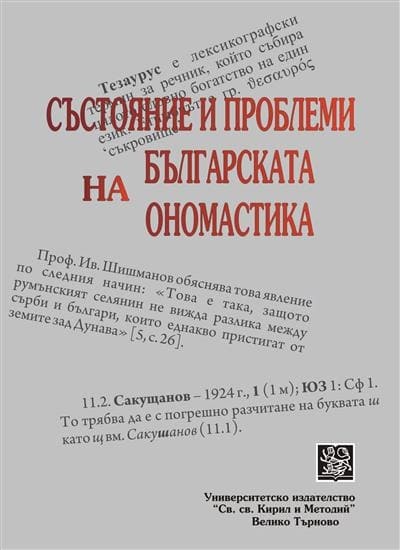Бележки за името на Пирин планина
Notes Regarding the Name of the Pirin Mountain
Author(s): Nikolay DautovSubject(s): Language studies, Language and Literature Studies, Geography, Regional studies, Physical Geopgraphy, Regional Geography, Theoretical Linguistics, Lexis, Historical Linguistics, South Slavic Languages
Published by: Великотърновски университет „Св. св. Кирил и Методий”
Keywords: Pirin; name; ethymology
Summary/Abstract: The article starts with a review on what has been written so far about the denominations of the Pirin mountain - Orbel, Beride and Yudenitsa – considered to be older – and outlines some hypotheses about their origin. Then we present the interpretations of different authors of the meaning behind the name Pirin. Some consider it to be Slavic, and others – Thracian. Most recently, there’s another view that the name has Ancient – Bulgarian (Bulgarian, Prehistoric – Bulgarian, Proto – Bulgarian) origins. The analysis of the different hypotheses results in two leading interpretations. The first one is the Slavic, supported by arguments from Ivan Duridanov. And the second is the Ancient – Bulgarian, formulated by Petar Goliiski, on the basis of a promulgated document by Kazimir Popkonstantinov from the 9th century, where the name Pirin has been attested. Based on what has already been written and the thorough analysis of the geographical (territorial) display of all registered toponyms so far, linked to the name Pirin (Pìrin (Pirìn), Pirìn kuzù, Pìrina, Pirin, Pirìnski vàlog, Pirìnsko prisòe, Pirìnski livàdi and Perin), an interesting conclusion could be drawn. Almost all of the above mentioned denominations are registered within the confines of Medieval and present day Bulgaria, except for two: Perin in Novgorod, Ukraine and Pirin in Sarajevo! The Ukrainian Novgorod is situated at the middle stream of the river Dnieper – a region that was the heart of Old Great Bulgaria – the domain of Khan Kubrat. It is harder, however, to provide evidence of Bulgarian presence in Sarajevo. The inclusion of Bosnia and Herzegovina within the confines of the Bulgarian country during the time of the kings Simeon I the Great and Samuil does not prove by any means that Bulgarians used to live there. However, Petar Goliiski quotes a message from the Armenian Simeon Lehaci (from the period of 1608 – 1620), connected with the presence of a Bul garian ethnical element in Sarajevo, which says: “It took us five days from here to get to Bosnia Saraj [Sarajevo], a big city, built on a high mountain… The inhabitants of this country [Bosnia] are big, tall, strong and muscular men. They have absolutely no knowledge of Turkish language and speak only Bulgarian… There are Bulgarian monasteries all around Bosnia… Everyone in Bosnia speaks Bulgarian”. This explains the Bulgarian relation to the presence of the toponym Pirin in Sarajevo. The toponyms of Pirin are widespread in lands, which had been inhabited by the Old Bulgarians in the past, therefore there’s a reason to believe that the oronym Pirin has a more plausible Ancient – Bulgarian, rather than Slavic origin.
Journal: Състояние и проблеми на българската ономастика
- Issue Year: 15/2018
- Issue No: 1
- Page Range: 111-123
- Page Count: 13
- Language: English, Bulgarian, Polish

